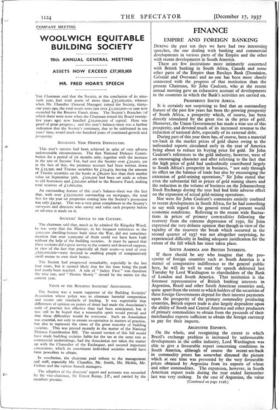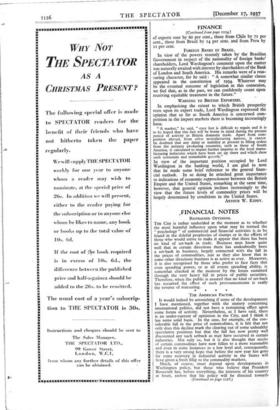FINANCE
EMPIRE AND FOREIGN BANKING
DURING the past ten days we have had two interesting speeches, the one dealing with banking and commercial developments in various parts of the Empire and the other with recent developments in South America.
There are few institutions more intimately concerned with British banking in South Africa, Canada and some other parts of the Empire than Barclays Bank (Dominion, Colonial and Overseas) and no one has been more closely connected with the progress of that institution than the present Chairman, Sir John Caulcutt, who at the recent annual meeting gave an exhaustive account of developments in the countries in which the Bank's activities are carried on.
PROSPEROUS SOUTH AFRICA.
It is certainly not surprising to find that an outstanding feature of the past few years has been the growing prosperity of South Africa, a prosperity which, of course, has been directly stimulated by the great rise ifi the price of gold. Moreover, the Union Government has made a wise use of this prosperity, and devoted much of its increased revenue to the reduction of national debt, especially of its external debt.
During part of this year there has, of course, been a material set-back in the market prices of gold shares owing to the unfounded reports circulated early in the year of America being about to reduce its buying price for gold. Sir John Caulcutt's references to the gold industry, however, were of an encouraging character and after referring to the fact that the high price of gold had undoubtedly contributed largely to South Africa's prosperity in business, " not only through its effect on the balance of trade but also by encouraging the extension of gold-mining operations," Sir John stated that even the substantial fall in prices of gold mining shares and the reduction in the volume of business on the Johannesburg Stock Exchange during the year had had little adverse effect on the expansion of actual gold-mining operations.
Nor were Sir John Caulcutt's comments entirely confined to recent developments in South Africa, for he had something to say with regard to the general trend of present world economic conditions. Referring to the recent wide fluctua- tions in prices of primary commodities following the recovery from the extreme depression of 193o, Sir John expressed the very definite opinion that though in view of the rapidity of the recovery the break which occurred in the second quarter of 1937 was not altogether surprising, he experienced difficulty in finding adequate justification for the extent of the fall which has since taken place.
SOUTH AMERICA AND BRITISH INTERESTS.
If there should be any who imagine that the pro- sperity of foreign countries such as South America is a matter of comparative indifference to the general public here, he will do well to read the speech delivered last Tuesday by Lord Wardington to shareholders of the Bank of London and South America. That institution is the foremost representative of British banking interests in Argentina, Brazil and other South American countries and, quite apart from the extent to which holders of the securities of these foreign Governments depend for their interest payments upon the prosperity of the primary commodity producing countries, British export trade is also largely dependent upon the ability of South and Central America and other producers of primary commodities to obtain from the proceeds of their merchandise exports sufficient to obtain the foreign currency to pay for their imports.
ARGENTINE EXPORTS.
On the whole, and recognising the extent to which Brazil's exchange problem is increased by unfavourable developments in the coffee industry, Lord Wardington was able to give a favourable report concerning conditions in South America, although of course the recent set-back in commodity prices has somewhat dimmed the picture which at one time was presented by the very favourable prices obtained by Argentina from its exports of wheat and other commodities. The expansion, however, in South American export trade during the year ended ieptember last was very striking. In the case of Argentina, the value (Continued on page 1126.)
FINANCE
(Continued from page ic 124.) of exporti rose by 6o per cent., those from Chile by 72 per cent., those from Brazil by 14 per cent. and from Peru by II per cent. FOREIGN BANKS IN BRAZIL.
In view of the powers recently taken by the- Brazilian Government in respect of the nationality of foreign banks' shareholders, Lord Wardington's comment upon the matter was naturally awaited with interest by shareholders of the Bank of London and South America. His remarks were of a reas- suring character for he said : " A somewhat similar clause appeared in die constitution of 1934. Whatever may be the eventual outcome of legislation in this connexion, we feel that, as in the past, we can confidently count upon receiving equitable treatment in the future."
WARNING TO BRITISH EXPORTERS.
In emphasising the extent to which British prosperity rests upon its export trade, Lord Wardington expressed the opinion that so far as South America is concerned com- petition in the import markets there is becoming increasingly keen.
" A market," he said, " once lost is difficult to regain and it is to be hoped that this fact will be borne in mind during the present period of activity in British domestic trade. Apart from com- petition abroad, from other manufacturing nations, it cannot be doubted that any delay or inability at present in filling orders from the primary producing countries, such as those of South America, is calculated to impart further impetus to the local manu- facturing industries which have been set up there and which show such consistent and remarkable gro wth."
In view of the important position occupied by Lord Wardington in the banking world, I am glad to note that he made some brief reference to the general finan- cial outlook. In so doing he attached great importance to indications of economic rapprochement between the. British Empire and the United States, remarking at the same time, however, that general opinion inclines increasingly to the view that the future levels of commodity prices will be largely determined by conditions in the United States.
ARTHUR W. KIDDY.















































 Previous page
Previous page